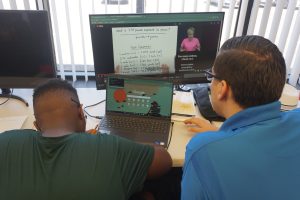Tailored Learning: How Schools for Autistic Children Address Unique Needs
 Navigating the educational landscape when your child has autism can be challenging. Traditional schools may not always provide the specialized support and understanding that autistic children require to thrive academically and socially. Parents might be worried about if their child is being bullied, how they will interact with other kids, how teachers will treat their child, and a variety of other worries concerning a child with autism. These are all valid concerns and need to be addressed if a parent wants to feel that their child fits into a school. I have a couple of students that I coach with autism. It is a struggle for schools to accommodate students with such unique abilities, limitations, and talents. That’s where schools specifically designed for autistic children come into play. In this blog, we’ll explore how these schools cater to the unique needs of autistic students.
Navigating the educational landscape when your child has autism can be challenging. Traditional schools may not always provide the specialized support and understanding that autistic children require to thrive academically and socially. Parents might be worried about if their child is being bullied, how they will interact with other kids, how teachers will treat their child, and a variety of other worries concerning a child with autism. These are all valid concerns and need to be addressed if a parent wants to feel that their child fits into a school. I have a couple of students that I coach with autism. It is a struggle for schools to accommodate students with such unique abilities, limitations, and talents. That’s where schools specifically designed for autistic children come into play. In this blog, we’ll explore how these schools cater to the unique needs of autistic students.
Understanding Autism
Autism spectrum disorder (ASD) is a developmental condition that affects communication, social interaction, and behavior. Each autistic individual is unique, with their own strengths, challenges, and needs. Traditional classroom settings can be overwhelming for autistic children, with sensory stimuli, social expectations, and rigid routines posing significant barriers to learning. These unique conditions can affect their social, academic, personal, and family life. Most students their age will not be able to understand how to interact with autistic students. These types of students can often be mislabeled for their actions.
The Importance of Tailored Education
Autistic schools recognize that one size does not fit all when it comes to education. Instead of trying to force autistic children into a neurotypical mold, these schools embrace their differences and provide tailored learning experiences that meet their specific needs. From sensory-friendly classrooms to individualized instruction, autistic schools create environments where every child can thrive. These schools usually have trained staff that understand the nuances of autism and working with these types of students. It can make all the difference having a teacher that understands your child and how to effectively support them.
Creating Supportive Environments
One key aspect of autistic schools is their focus on creating supportive environments that accommodate the sensory sensitivities and communication challenges of autistic children. Classrooms are designed with sensory-friendly features such as soft lighting, quiet corners, and flexible seating options. Visual schedules and communication aids help students navigate their daily routines and express their thoughts and feelings effectively. The environment is essential for them to feel comfortable enough to learn. There are a lot of different ways to make a child feel safe but having things specifically designed for autistic children can be a game changer. It helps with everything that a child does.
Individualized Instruction

Another hallmark of autistic schools is their emphasis on individualized instruction. Rather than following a one-size-fits-all curriculum, teachers tailor their lesson plans to accommodate the learning styles and preferences of each student. This personalized approach allows autistic children to learn at their own pace and focus on areas where they need additional support. They will be at all different academic and personal levels. It is the job of education to help these students to be successful in life not just school. This takes an additional level of capability for teachers to be able to think of not only the academic learning but the skills needed in future life. We hope that the education given can assist these children to be self-sustaining, successful, and happy in their life!
Social Skills Development
Social interaction can be challenging for autistic children, but it’s an essential skill that plays a crucial role in their development and well-being. Autistic schools provide opportunities for social skills development in a supportive and understanding environment. Through structured activities, group projects, and peer interactions, students learn valuable social skills such as communication, cooperation, and empathy. These are the skills that are some of the most important for autistic students to learn. If these students practice, learn, and understand how to socialize, a lot of their issues with be solved before integrating into society. Every child needs to have friends. People that they interact with and love. These schools will bridge the gap for these students that would otherwise not get the practice, opportunity, and lessons that they need in order to build their social skills.
Parental Involvement and Support
Parental involvement is vital in ensuring the success of autistic children in school. Autistic schools recognize the importance of partnering with parents and caregivers to create a collaborative and supportive learning environment. They provide resources, workshops, and support groups to help parents better understand their child’s needs and advocate for their educational rights. Each parent need to understand their child. Each child will have a different level of capability and it is important for parents to know that capability. In the mind of each parent, they are wondering how their child will be successful in their future. It is important that their education is leading them to be successful. As parents understand what is going on at school, they can work at home to achieve the same goals. It also works the other way. As the school understands what is being done at home, they can help supplement at school. Parent involvement is key to ensuring success at a school!
Conclusion
Autistic schools play a vital role in meeting the unique needs of autistic children and empowering them to reach their full potential. By creating supportive environments, offering individualized instruction, fostering social skills development, and partnering with parents, these schools ensure that every child receives the specialized support and understanding they deserve. If you’re a parent of an autistic child, consider exploring the options available at autistic schools to provide your child with a tailored learning experience that meets their specific needs and helps them succeed academically and socially. At Leadership Society of Arizona we support these types of children in a supplemental way with our coaching program, summer programs, and other unique events. We have found that autistic teenagers fit into our safe environment where we give students an opportunity to socialize, learn skills, and build confidence. They thrive in team building activities as instructors help guide students in the right direction. We have PhD instructors working with kids who understand how to assist them in learning the soft skills that they need to be successful. I hope you check out our services as well!
Unique Education In Arizona
Arizona is leading the charge for educational choice. As one of the first states to open the door for innovative charter schools, Arizona offers a wide variety of schools to choose from. In the summer of 2023, Arizona passed a law that allows more state funding to be used for private schools as well as charter schools. Because of this change, Leadership Society of Arizona was able to support the grand opening of an innovative private school in August 2023. LeadAZ Private School has created a unique blended approach to homeschooling and in-person education. Students can set the pace of their education but they also get one-on-one access to a team of highly-qualified instructors. Every student creates their own customized education experience. To make this possible, LeadAZ maintains a ratio of only 4 to students to every 1 instructor.
